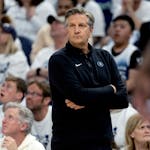Four years ago, in the downstairs portion of the 508 Bar and Restaurant and just an outlet pass away from Target Center, Flip Saunders embraced his new point guard, Tyus Jones.
Saunders used some colorful language as he implored Jones to play his butt off because of all the work Saunders had done to acquire him that night, trading two second-round picks in that 2015 draft and a future second-round pick to Cleveland to nab Jones with the No. 24 overall pick in the first round. Paired with No. 1 overall pick Karl-Anthony Towns, Jones gave Wolves fans a night to celebrate and remember.
Flip, a former point guard himself, was not shy in his praise for Jones. He said that night: "He'll get you into an offense, and he's a natural leader. Some guys have the ability to know how the game is played and the tempo of the game. And he never seems to get rattled. The bigger the stage, the better he plays."
What seemed like a perfect fit in many ways — the hometown kid from Apple Valley returning home after winning an NCAA title at Duke — gave way instead to four seasons that were far from it.
Jones' time in Minnesota started with tragedy, when four months after that draft Hodgkin's lymphoma took Saunders' life. There were a million reasons to mourn Flip's passing from a personal standpoint; from a basketball standpoint, it meant his vision of what Jones could be was never realized.
In four seasons with the Wolves — the last three beginning with Tom Thibodeau as head coach — Jones played 247 games, starting 34. His high IQ, pass-first skill set always seemed better suited to a role as a starter, but his level of play and conventional wisdom relegated him to a role as a backup who could start in case of injury.
From Flip to Thibs and now to Flip's son Ryan (under new basketball boss Gersson Rosas), the question remained: What exactly was Jones' role and place in the NBA?
That question leads us to Sunday night, when our Chris Hine and others reported that Jones will sign a three-year, $28 million offer sheet with Memphis as a restricted free agent. The Wolves have two days to match the offer, but if you read the tea leaves and look at the Wolves' salary cap that seems like a less than likely proposition.
If this is the end for Tyus with the Wolves, what does it mean?
Well, for Jones it likely means a role somewhat similar to the one he had here since Memphis also added rookie point guard Ja Morant with the No. 2 overall pick in last month's draft — though for the contract he is getting Jones might find his way into more minutes.
For the Wolves, it's more interesting. If Jones isn't back, we know that sentimentality won't be a factor in roster construction under Rosas. A deal is either good or bad, and if the number wasn't right on Tyus the new regime was ready to move on.
They figure at this point to go into next season with Jeff Teague (on the last year of his deal at $19 million) as their clear-cut starter. Shabazz Napier, though on a non-guaranteed contract, could make the roster as a backup after coming over from Golden State. Maybe the Wolves would add one more veteran on a one-year deal with part of their mid-level exception. And perhaps the Wolves could experiment with lineups that don't have a traditional point guard, letting the likes of rookie Jarrett Culver run things at times.
If that feels like a temporary solution, you're right. But what's also interesting is that the real object of the Wolves' affection, D'Angelo Russell, might only be a short-term fit with the Warriors after signing a four-year max deal. Russell could be on the move again next offseason when Klay Thompson is healthy and the Warriors have more salary questions.
It wouldn't be surprising at all — nor would it be bad strategy — for the Wolves to treat this as a developmental year. Implement new systems. Improve from within. Wait for Teague's contract to come off the books next offseason and find a taker for Gorgui Dieng in order to make another run at Russell.
That pursuit would be tougher with Jones counting close to $10 million against the cap over the next three years. And in a star-driven league, it's clear which one of those two players could move the needle more.





